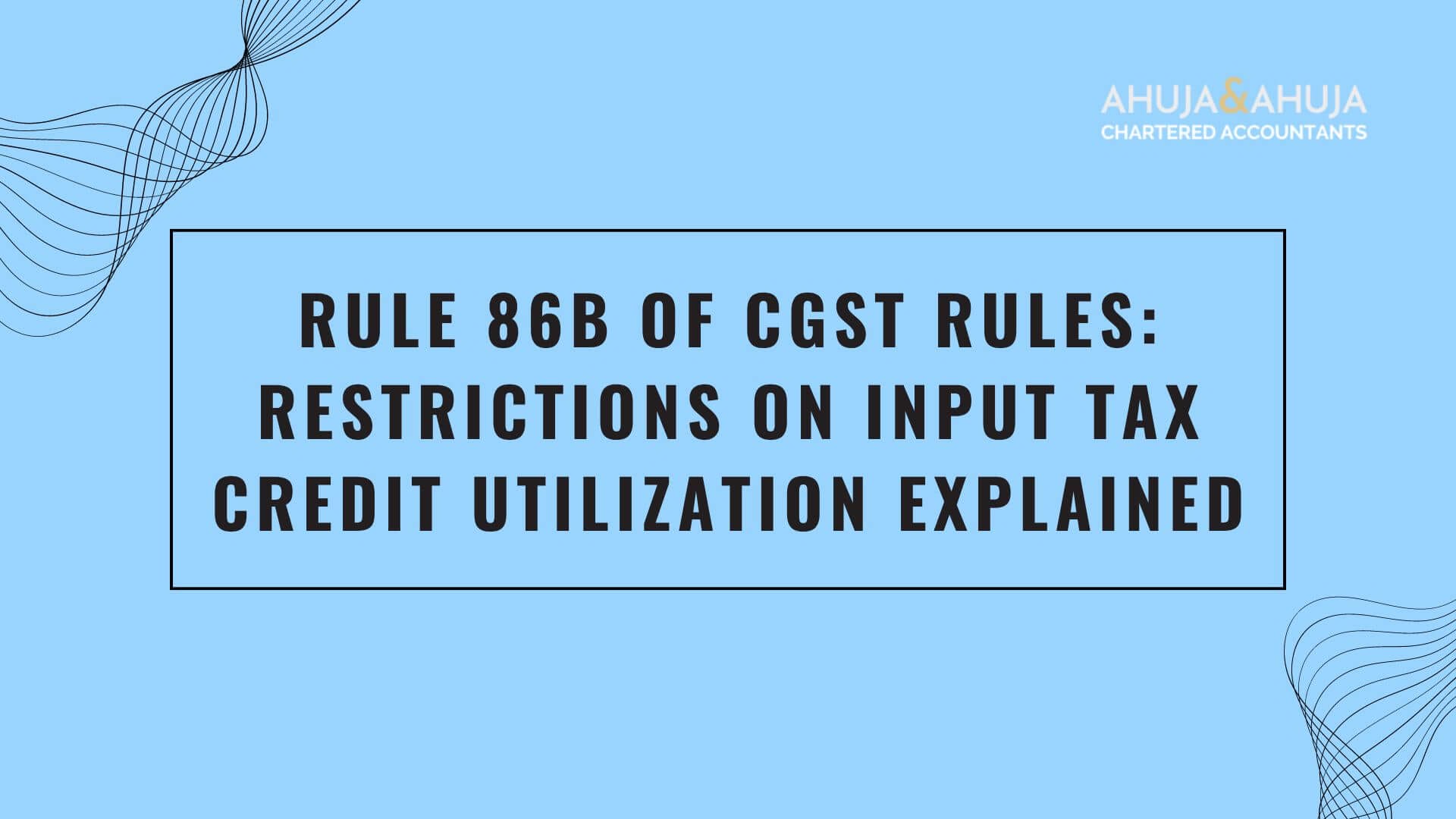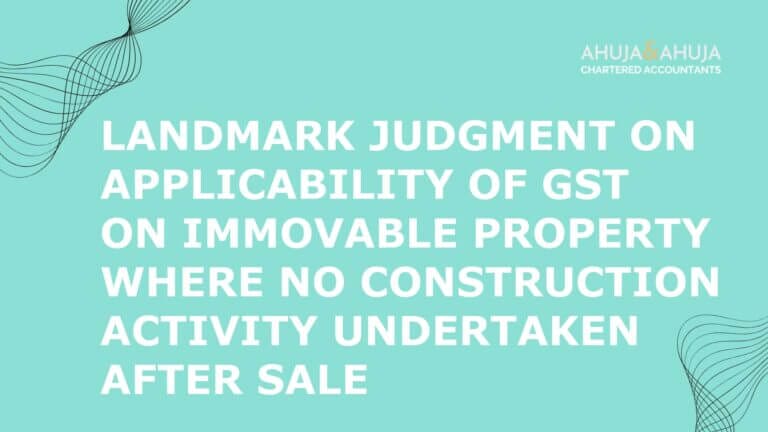Rule 86B of CGST Rules: Restrictions on Input Tax Credit Utilization Explained
The realm of Goods and Services Tax (GST) in India has been continually evolving to plug loopholes and enhance compliance, ensuring a robust taxation environment.
One important component of GST is the concept of Input Tax Credit (ITC), which essentially allows businesses to reduce the taxes they pay on inputs from the taxes they need to collect on sales, making it a critical facet for business liquidity and operational efficiency.
Introduced with effect from 1st January 2021 via GST [Notification number 94/2020 dated 22nd December, 2020], Rule 86B has been a significant amendment in the CGST Rules. This rule was crafted primarily to curb the menace of fake invoicing and tax evasion that undermines the integrity of the financial ecosystem.
Purpose of Rule 86B
Rule 86B is not just a regulatory update; it symbolizes a strict compliance measure to ensure that tax credit mechanisms are not misused.
By restricting the use of ITC available in the electronic credit ledger for discharging the output tax liability, the government aims to ensure that the credit benefits genuinely reflect the actual transactions and are not a result of fabricated invoicing.
Understanding the value of taxable supply is crucial here as it directly influences the computation and limitation set forth by Rule 86B.
Navigating Through this Change
For businesses, particularly those who shoulder a substantial transaction volume, keeping abreast with such updates like Rule 86B is vital.
The implementation of this rule emphasizes the importance of meticulous documentation and verification of GST transactions to avail credit.
This plays a fundamental role, especially when preparing for GST returns which from now on would need careful handling to ensure compliance with Rule 86B.
For comprehensive support and professional advice on managing these changes, consider leveraging expert GST return filing services. Such guidance is pivotal not only in adapting to the new rule but also in streamlining GST processes to optimize tax liability beneficially.
What is Rule 86B?
Rule 86B restricts the utilization of input tax credits (ITC) for discharging the GST liability to a maximum of 99% of the tax due in cases where the taxable value of supply other than exempt supply and zero-rated supplies, in a month exceeds 50 lakh?
This means that businesses whose turnover exceeds this threshold will now have to pay a minimum of 1% of their output tax liability in cash, which cannot be offset via ITC.
This mechanism serves as a check against entities that may inflate their ITC claims through fake invoices or other fraudulent means. The rule is geared towards businesses with high-volume transactions, ensuring that the ITC claimed matches the real economic activity.
Applicability of Rule 86B
Rule 86B applies selectively, targeting specific scenarios under the GST framework. Understanding its applicability is crucial for businesses to ensure they meet the criteria and maintain compliance accordingly.
Criteria for Applicability
Rule 86B is not universally applicable to all registered GST entities. It specifically applies to those registered businesses whose total taxable value of the supply, excluding exempt supply and zero-rated supply, exceeds 50 lakh in a month. Here is what you need to consider:
- Monthly Assessment: Businesses need to assess their taxable turnover each month to determine if Rule 86B applies to them for that particular month.
- Exclusion of Certain Supplies: When calculating this threshold, exempt supplies and zero-rated supplies are omitted from the total taxable value.
Monitoring Turnover
It’s imperative for businesses, especially those operating close to this threshold, to accurately monitor their turnovers. Monthly checks must be established to verify if they exceed the specified 50 lakh mark, necessitating compliance with Rule 86B for that duration.
For organizations that find themselves frequently oscillating around this threshold, maintaining meticulous records becomes even more significant.
Utilizing efficient tools from Input Service Distributor (ISD) under GST can aid in the accurate distribution of tax credits and ensure that they are correctly allocated and documented.
Exceptions to Rule 86B
Even if a business’s turnover exceeds 50 lakh, there are certain conditions under which Rule 86B may not apply. Understanding these exceptions can relieve businesses from the obligation of paying the 1% tax liability in cash, depending on their circumstances:
- Income Tax History: If the income tax paid by the proprietor, managing director, partner, or any of its directors is more than 1 lakh in each of the last two financial years, the entity is exempt from this rule.
- Refund Receipts: Entities that have received more than 1 lakh as a refund in the previous financial year on account of export under LUT (Letter of Undertaking) or due to an inverted duty structure are exempt.
- Cumulative Tax Payments: If the registered person has cumulatively paid more than 1% of the total output tax liability by the cash ledger up to that month in the current financial year, they are exempt from this rule.
- Government Entities: Public sector undertakings, government departments, and other statutory bodies are also exempt from these restrictions.
- Commissioner’s Discretion: In specific cases, based on the facts and after due verification, the Commissioner has the discretion to waive this restriction.
Understanding these exceptions is crucial as it directly impacts the financial strategy businesses might need to adopt to comply with GST regulations.
Impact of Rule 86B on Businesses
The implementation of Rule 86B has noteworthy implications, particularly for large businesses with substantial monthly turnovers. Understanding these effects is essential for strategic financial planning and compliance.
For Large Businesses
- Increased Cash Flow Requirement: With the restriction on not being able to utilize more than 99% of ITC, large entities must ensure they have sufficient cash reserves to meet the minimum 1% cash tax liability. This could influence their operational cash flow management.
- Enhanced Compliance Burden: The need to assess monthly turnovers and ensure adequate cash payments increases the compliance burden. This may necessitate more robust accounting systems and possibly more frequent consultations with tax advisors.
For Small Businesses
- Limited Immediate Impact: Businesses with a monthly taxable turnover of less than 50 lakh are not directly impacted by Rule 86B. However, they must remain vigilant about their turnover to ensure compliance if they approach this threshold.
- Preparation for Growth: Small businesses aspiring to expand their operations must prepare to meet the requirements of Rule 86B as their turnovers increase. This includes gearing up for more rigorous financial tracking and compliance practices.
Overall Impact
- Encouraging Transparency: By mandating a minimum cash tax payment, Rule 86B aims to reduce fraudulent activities such as the issuance of fake invoices. This can lead to a more transparent GST compliance landscape.
- Financial Strategy Revaluation: Businesses might need to reevaluate their financial strategies, particularly in terms of tax planning and cash management, to adapt to the demands of Rule 86B effectively.
FAQs on Rule 86B
To enhance understanding and clarify common queries regarding Rule 86B, here are some frequently asked questions:
Who exactly is affected by Rule 86B?
- Any GST-registered business whose monthly taxable turnover exceeds 50 lakh is affected, except for those who qualify under the specified exceptions.
What means of tracking should businesses employ to ensure compliance with Rule 86B?
- Businesses should integrate efficient accounting software and systems to continuously monitor their turnover and ensure accurate tax filings and ITC claims.
Is there any penalty for non-compliance with Rule 86B?
- Non-compliance can lead to serious penalties under GST laws, including fines and other legal consequences. Continuous monitoring and consultation with tax professionals are advised to avoid such scenarios.
Can the restriction under Rule 86B be waived off?
- Yes, the Commissioner has the authority to waive off this restriction on a case-by-case basis after due verification of facts.
Conclusion
Rule 86B of the CGST Act represents a critical measure aimed at curbing tax evasion and promoting fair tax practices.
By understanding its applicability, restrictions, exceptions, and impacts, businesses can better navigate their compliance journey.
For personalized guidance and efficient handling of Rule 86B implications, engaging with professional tax advisors is highly recommended to ensure smooth and compliant business operations.
Disclaimer
The materials provided herein are solely for educational and informational purposes. No attorney/professional-client relationship is created when you access or use the site or the materials. The information presented on this site does not constitute legal or professional advice and should not be relied upon for such purposes or used as a substitute for professional or legal advice.







